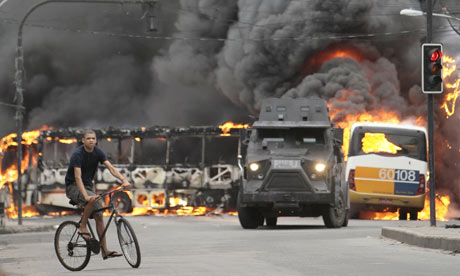
Bandidos in Rio shot down a police helicopter over the Zona Norte favela Morro dos Macacos after police apparently tried to intervene in a battle between two rival drug gangs--Amigos dos Amigos, which controlled the favela, and Comando Vermelho. (The picture here seems to show burnt out buses on the edge of the favela (hint: I don't know of any favelas that have traffic lights.) So far, authorities have said that 12 people have died.
The Guardian has details.
Two interesting facts:
1. "Hundreds of police officers descended on the area following the invasion" by the Comando Vermelho. This is significant because when I was in the favelas (eight years ago, which, I admit, in the fast changing world of the drug traffickers, can be considered ancient history), Amigos dos Amigos was known to be in cahoots with the cops. Indeed, a veteran police officer confirmed this to me. So no one should discount the possibility that the police were taking sides in this fight.
and
2. The drug gangs have "an increasingly sophisticated arsenal, including anti-aircraft guns and automatic rifles, often sourced from inventory intended for the Bolivian and Argentinian armies and smuggled into Rio." Isn't that a big story? These arms are undoubtedly stolen from official shipments. How can this be happening and isn't there a way for officials--including those in the U.S., which is most likely supplying the weaponry--to prevent it?




5 comments:
Meanwhile in the Netherlands:
http://yuriyr.com/blog/?p=224
Rio 2016?
http://ovelhadog.blogspot.com
Ovelhadog: Some of the coverage has pointed out the juxtaposition of the Olympic pick and the firefight.
I doubt that this was a favela show of force in reaction to all the international attention. It really does seem, from what I've read, that the police intervened in a fight between two drug gangs, with tragic consequences.
And I don't think the police have to wipe out the drug gangs to have a safe Olympics. In fact, I'd guess the bandidos are happy the Olympics are coming to Rio, too. They're patriotic, too.
Here are two real issues about the Olympics, though:
1. Can Rio ensure that, unlike in Beijing, poor communities won't be displaced to make way for various arenas and housing pavillions.
2. Will the mass of people benefit from it, or will the profits just wind up in the hands of a chosen few.
These arms are undoubtedly stolen from official shipments. How can this be happening and isn't there a way for officials--including those in the U.S., which is most likely supplying the weaponry--to prevent it?
Most come through the border from Bolivia or Paraguay, stolen (or sold) from the local armies. Some are smuggled via FARC/Venezuela. There's no control whatsoever.
It really does seem, from what I've read, that the police intervened in a fight between two drug gangs, with tragic consequences.
Was it better to let them just kill each other without interfering? Maybe.
And I don't think the police have to wipe out the drug gangs to have a safe Olympics. In fact, I'd guess the bandidos are happy the Olympics are coming to Rio, too.
Sure, lots of coke and dope to sell to tourists. The government will just make an agreement with the drug dealers so that they remain quiet for a month, it's cheaper than sending in the BOPE.
Can Rio ensure that, unlike in Beijing, poor communities won't be displaced to make way for various arenas and housing pavillions.
No, but perhaps they should be displaced from the Mata Atlântica spots that they devastate.
Will the mass of people benefit from it, or will the profits just wind up in the hands of a chosen few.
It will benefit the mass of Brazilian politicians...
Sad state of affairs..I live in Rocinha and I hope that there is no relocation type of thing while the olympics are on.
During the Pan American Games in 2007, there was much more police presence and crime did not happen so much as I did not read any stories at that time of problems.
Post a Comment